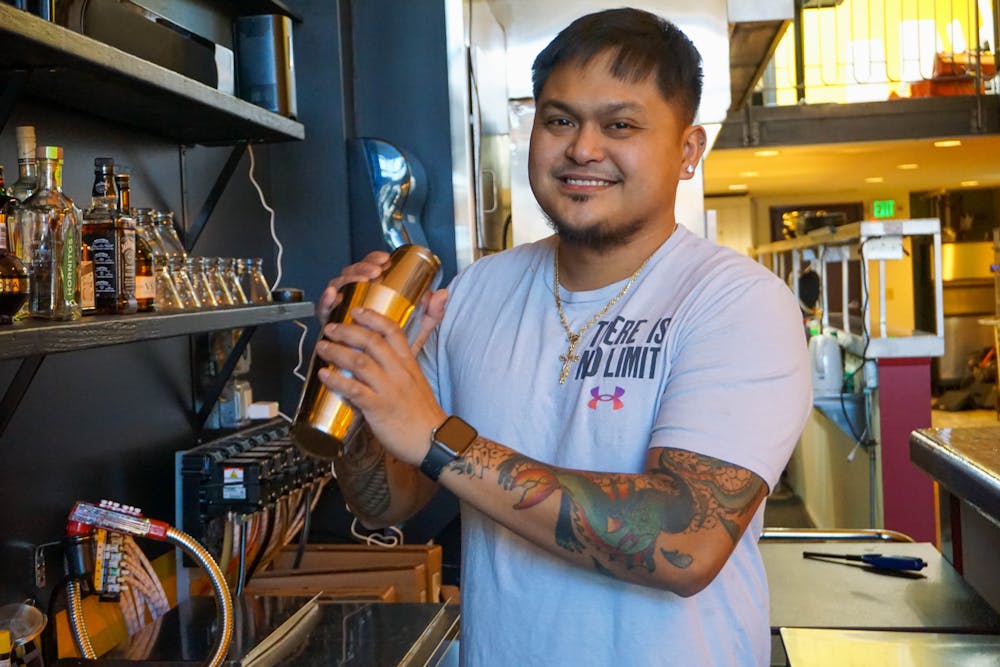I learned early on about the importance of food in our culture and how it brought people together.
As a second-generation Filipina American, I remember my lolas (grandmothers) and titas (aunts) cooking in the kitchen while dozens of people – friends and family alike – would bring trays of lumpia, pots of sinigang and adobo, desserts like ginataang bilo bilo, turon and my personal favorite, a rice noodle dish called pancit palabok. Meanwhile, everyone sang karaoke in the living room.
Coming to Bellingham, I found myself wanting a taste of traditional cooking. Considering how Bellingham is situated between Seattle and Vancouver, B.C. – both of which have huge Filipino populations – I was disappointed to find that there was little Filipino representation.
So I was excited to hear Bryan Matamorosa, owner and chef of Bry’s Filipino Cuisine, recently opened his new restaurant at the beginning of March. Ironically, Matamorosa grew up in the same province where my dad was born. Learning that he’s bringing food from the Bicol region warmed my heart. Through his restaurant, Matamorosa not only shares Filipino food in Bellingham but also provides Filipino representation and success for our community.

I chose to do a Q and A interview with Matamorosa to highlight the importance of implementing Filipino culture into Bellingham and to illustrate how the Filipino community already present here can feel supported and well represented.
Q: What got you into cooking in the first place?
A: I've always enjoyed food because I grew up on a farm. In the Philippines, we eat at least three times a day together, and I enjoy that part too. Whenever my uncle or whoever was cooking in the kitchen, I was always curious about how they made it. I just enjoyed that part where family gets together and eats. I went to nursing school in the Philippines because of the stereotype that we enjoy taking care of people, but I couldn’t transfer my credits here.
[There is a common stereotype that most Filipinos are nurses and are known for being caregivers. There is pressure to go into nursing, stemming from the societal structures and public attitudes in the Philippines.]
I thought ‘How do I still take care of people without really doing medical stuff, nursing or caregiving?’ But food is what brings everybody together and a chance for me to take care of people too. And that's what I loved and enjoyed doing.

Q: What made you decide to bring part of the Filipino culture into Bellingham?
A: In 2019, there wasn't any Filipino restaurant here in town. I wanted to bring Filipino food here and share the food that we eat. The best way to do that, I noticed, is to join the Bellingham Farmers Market. And it's because I've done the Bellingham Farmers Market before with a different business name with my friends when we were still students in culinary. We did one season over there in 2017 during an internship after the first year and I saw a lot of success with that and I wanted to do that just myself.
Q: What food from the Bicol region are you planning to serve in your restaurant?
A: We’re gonna have Laing and Bicol Express. ... In the past, I wasn’t doing a lot of spicy stuff. But the Bicol region is the spice capital of the Philippines. So really, I should make my food a little bit more spicy. Where I grew up, we ate fish at least once a day. Dried fish too, so I’m
I know a lot of people here like Caesar salad. So I’m thinking about making a Ceasar salad with anchovies and some type of local dried fish that we have [in the Philippines] and getting some flavor from there. Halo-halo maybe, but not the traditional way – we’re gonna make it look fancy.
Q: Do you think Bellingham has good Filipino representation overall?
A: There are not a whole lot of Filipinos here in the community. And it's a little sad because most of the people I've met are working in factories. I wanted to influence them, [show] that we could do better than just working in factories. We can do better, but we need to educate ourselves and have a little bit of motivation to be a better person.
Q: What does Filipino representation mean to you overall?
A: Filipinos really represent ‘family.’ It's family food. Food is always a big thing. Every Filipino – no matter where you go – and you go to their house, they will ask you if you're hungry. It's always the hospitality of the Filipinos that's amazing. We'll take care of you.

Q: What are your hopes for the Filipino community in Bellingham for the future?
A: This business is for everyone. I thought it would be nice to have more support from Filipinos because it felt like that's kind of what's lacking with my business. I do care a lot about everybody. That’s why I want to become a model for Filipinos.
After talking with Matamorosa, I got the sense of home and community that I’ve been missing since coming to college. As he said earlier, Filipinos represent family – and spending an hour at Matamorosa’s restaurant reminded me of that feeling.
Even speaking with him brought me so much closer to my community and made me feel like I wasn’t alone, something I’ve been yearning for since being away from my family. He reminded me how strong we are together, and how it’s important to support our community and uplift each other in any way we can.
If you enjoyed this story and want to read more about finding community through local cuisine, click here.
Jordan Brotamonte (she/her) is an opinions reporter for The Front this quarter. In her free time, she skis, takes photographs, and spends most of her time trying new coffee shops around Bellingham or exploring new places outdoors. You can reach her at jordanbrotamonte.thefront@gmail.com.






